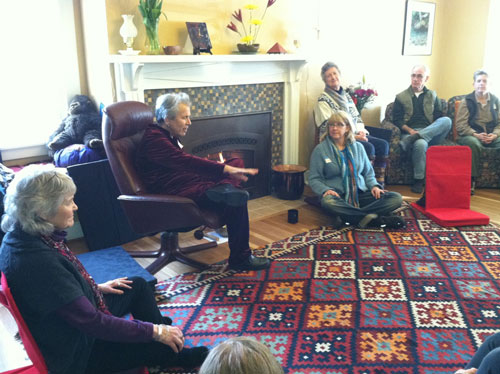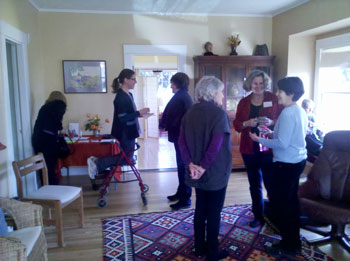
Nelly Kaufer gives a dharma talk to meditation students at the Pine Street Sangha open house.
Photo: Marianna Crawford

Pine Street Sangha Celebrates A New Home for New Practice
The gorilla watches from the corner of the new Pine Street Sangha’s living room. Seated next to a Tibetan singing bowl used for signaling the beginning and end of meditation sessions, its glass eyes stare peacefully out at a room of 30 people quietly meditating.
Over the past two months, the stuffed animal has vigilantly observed the comings and goings of community members as they transformed a quaint house near Mount Tabor, in the southeast end of Portland, into a new spiritual home. The gorilla is a humorous fixture in the room, indicative of the break with tradition characteristic of Recollective Awareness meditation. But the gorilla now quietly witnesses a very serious event.
Whereas 10 minutes before the room had hummed with the conversation and laughter of an eclectic group of Portlanders—nurses and students, former hippies and current businesswomen—it has now settled into a profound silence. The silence is a purposeful one and, in this moment, means something different to every person seated around the living room.
To one, the silence is a chance to settle deeply into an awareness of her breath. For another it’s an opportunity to think about the argument he had with his child the night before. Yet another uses the 20 minutes to berate herself for not being able to clear her mind of thoughts. Even while everyone approaches this silence differently, they all are unified in their understanding of the silence’s purpose. By meditating, they hope to understand their inner worlds better and become, in some small measure, liberated from the fears and suffering that affect them.
The opening of the new Pine Street Sangha is significant in that it houses a tradition, Recollective Awareness, which welcomes each of these individuals’ experiences as valid subjects of meditation. It recognizes these experiences’ potential to provide understanding about the way the dharma—the fundamental truths taught by the Buddha—functions in each person.
Since meditation teacher Nelly Kaufer founded the Portland center in 2005, this fresh approach to meditation has drawn a robust and varied community. For years the community met in the third floor of the building where Kaufer practiced psychotherapy.

Members of the newly-opened Pine Street Sangha catch up and get to know each other.
Photo: Val Garrison
“However, things were growing and we needed a place that people could call their home,” Kaufer said in an interview, “a place where they could practice more frequently, and where I could have more meditation events.”
After Kaufer purchased the house in November, 2011, the meditation community came together in the spirit of generosity to outfit it with new tiling, furnishings, Buddhist art, and a 2-foot-tall gorilla. A Feb. 4 inaugural open house celebrated the community’s new home with food, teachings, and two meditation sessions.
The opening of the Pine Street Sangha represents the culmination of months of work by members of Portland’s Recollective Awareness meditation community, and an opportunity for Portlanders to explore meditation through an approach that is radical in its gentleness and profundity.
A longtime Portland resident and psychotherapist, Kaufer began instructing students in Vipassana meditation in the mid 1980’s. While she appreciated the benefits of Vipassana meditation—a practice that focuses on continually returning to the object of attention—enough to continue teaching it for several decades, Nelly nonetheless felt dissatisfied with its narrow view of what constituted wholesome meditative experience. Her encounter with Recollective Awareness meditation in 2004 gave her dissatisfaction a voice and her teachings a new direction. Nelly spoke about this in an interview:
“In most traditions, a specific course of development in terms of learning meditation and the dharma are proscribed. Most forms, at least in Vipassana, say that to learn the dharma is to be in touch with your own experience, but most Vipassana teachers are telling their students through their teachings what they should experience.
What Recollective Awareness meditation does is trust that students can discover the dharma in their experience. The way that’s done is through the interview. The teacher explores with the student what their actual experience is, rather than looking for the experience they think they should be having.”
In order to help them observe their “actual experience,” Recollective Awareness gives meditators radically simple instructions: Approach your experience with gentleness and curiosity, acknowledge thoughts and feelings as valid subjects of meditation. Afterwards, either through a journal or dialogue with a teacher, attempt to recollect as much as you can about your sit.
Describing Recollective Awareness further, Kaufer says, “Why not keep it simple and say, honestly, the purpose of this meditative technique is to know more about your inner world and develop gentleness towards and curiosity about it? This is a slow approach but it’s quite deep. We’re learning the dharma much more deeply from our own experience, and it’s a different sort of knowledge.”
While meditators interested in learning about the approach of Recollective Awareness meditation can do so through reading “Unlearning Meditation,” a book by the technique’s founder Jason Siff, a thorough investigation of this meditative approach really takes place by sitting, and then talking with other meditators.
Kaufer spoke about the importance of sitting with a group: “In this approach the real value in the group lies in hearing other peoples’ reports. Through reporting, we get a chance to honestly see how the dharma functions in others’ experience. Plus, for many people it’s easier to practice with others around.”
The new Pine Street Sangha will expand the community’s ability to extend offerings to Portlanders, by allowing the sangha to hold more weekend retreats, weekly sitting groups, and dharma study events. The new home will give meditators a chance to explore a fresh and powerful approach to meditation in the company of others and under the guidance of teachers.
In addition to weekly sittings and frequent retreats, Kaufer and Siff will be teaching a joint retreat in July. In order to contact Kaufer about meditation sittings and upcoming events in Portland, email Nelly@skillfullmeditation.org. For those interested in Recollective Awareness meditation in Spokane, email Mary Webster at maryw@icehouse.net.
Additionally, the sangha will, as space and time permit, also serve as a home to other Buddhist groups. For example Jacqueline Mandell, the founding teacher and director of the Samden Ling Tibetan meditation group, will be holding Sunday classes in the Pine Street Sangha beginning April 15. For more information, visit www.samdenling.org.
About the author:
Nathan Robnett-Conover is a student at Portland State University. He has practiced Recollective Awareness meditation for eight years, and is a member of the Pine Street Sangha.